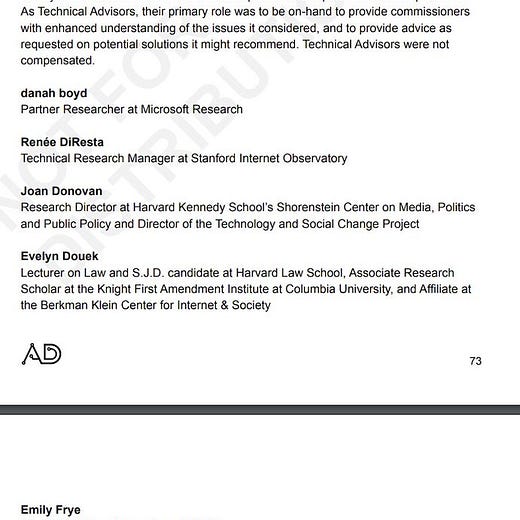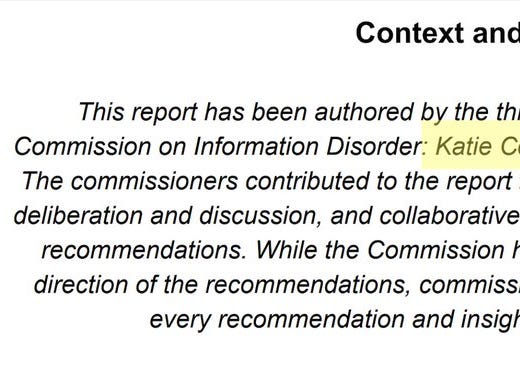The BBC and The Censorship Industrial Complex
The Twitter Files Hearing
All who campaign against what we see as unfair, tend to fixate on our own specialist areas of interest. Over the last three years I’ve had the great fortune to meet many wonderful campaigners all of whom contribute in their own particular way - based on their expertise and experience. Those who most effectively resisted government authoritarianism have included healthcare professionals, teachers, lawyers, writers. But, often, the most effective voices have been people who just feel that their lives have been changed, their freedoms curtailed, their children’s futures made more uncertain. None, I’m sure, expected to be censored or de-platformed or silenced for holding their views when they embarked on their campaigning journey.
Writing on this site has been useful for me in that it has proven that there are people out there - my wonderful subscribers - who share my sentiments and my concerns. Like many others I have chosen substack because it hasn’t sought to curtail my writing, or to attempt to get it ‘on message’.
And, over the last few years, a few themes have emerged in my writing. If you follow me on Twitter you’ll have noted growing anger aimed at those organs of society that are supposed to be protectors of free speech. Notably, the BBC.
I’m not sure why this pillar of democracy - free speech - is so important to me. It’s not as though I’ve been a serving BBC journalist, observing, from the newsroom, how output is now defined by an agenda and policed by Ofcom, the Office of Communications, and Chief Censor of broadcasting output. Perhaps it’s because I used to take free speech for granted, until it was taken away.
I wonder, often, how acquainted BBC journalists are with the BBC’s 5 “Public Purposes”. Here’s the first of them.
The BBC should provide duly accurate and impartial news, current affairs and factual programming to build people’s understanding of all parts of the United Kingdom and of the wider world. Its content should be provided to the highest editorial standards. It should offer a range and depth of analysis and content not widely available from other United Kingdom news providers, using the highest calibre presenters and journalists, and championing freedom of expression, so that all audiences can engage fully with major local, regional, national, United Kingdom and global issues and participate in the democratic process, at all levels, as active and informed citizens.
But remaining in the employ of a media organisation that now runs roughshod over these ideals should, surely, make some journalists question what role they are playing. Although perhaps paying the mortgage, or collecting the public sector pension, is more important than public purpose.
Earlier this week the BBC’s flagship current affairs programme, Panorama, ran a hit-piece directed at Twitter.
Bear in mind that Twitter is now under the control of Elon Musk who acquired the company, ostensibly, to restore its integrity as a social media platform. One of Musk’s first tasks was to dismantle a censorship machine that sat right at the centre of the company. And that was an important task. Because I, in common with those people I referred-to above, had become increasingly dependent on Twitter as a source of information and a platform for debate, by the time he took over.
Meanwhile, the BBC’s output, during the Brexit campaign, had become increasingly one-sided. The establishment’s preferred outcome was a remain vote. The BBC’s output was clearly influenced by its paymasters - the UK government. The establishment consensus - that remaining in the EU was preferable to leaving - was given vastly more coverage. And the weight of the UK government propaganda machine was focused increasingly on the BBC. It willingly obliged with a fear campaign warning of the catastrophe awaiting us if we voted to leave. And then we promptly voted to leave - well, a significant majority did so.
The leave vote clearly left people reeling - especially those in the British establishment.
During the Brexit campaign I - and thousands more - took to social media, especially Twitter, as a means of bypassing the BBC’s controlled narrative. Many argue that grass-roots social media campaigns got the message out about Brexit. And while the extremes of the arguments - on either side - got an airing, that’s the nature of free speech. It may not be pleasant, but, ultimately, it’s healthy for democracy.
However, Twitter is a global platform, headquartered in San Francisco. With the election of Biden it was clear that narrative control and censorship was going to define his first term in office. Build Back Better became the mantra for his administration, as well as Boris Johnson’s - and the other globalist, authoritarian leaders closest to the World Economic Forum’s “stakeholder capitalism” (corporatism) blueprint.
When Musk took the reins at Twitter he took remarkably little time to release the full extent of the censorship industrial complex that was active within the company - fully connected to the apparatus of the US Intelligence community. The first release of Twitter files - by Matt Taibbi - focused on the Hunter Biden laptop leak, and the systemic, Democrat-sponsored campaign to ensure that the content would never see the light of day via Twitter. Instead it was smothered by a nonsense “Russian disinformation” spin - and the main ‘hack and leak’ accounts on Twitter, hoping to spill the Biden laptop story, were de-platformed or suppressed.
The full extent of suppression by the censorship industrial complex was made clear yesterday at the The House Judiciary Select Subcommittee on the Weaponization of the Federal Government. The hearing was held, “to examine internal Twitter documents concerning content moderation decisions made by the social media company. These documents were often referred to as the “Twitter Files,” and were made public in December 2022. Journalist Matt Taibbi and author Michael Shellenberger were among those given access to the documents. Both testified for more than two hours on what these documents contained, with a focus on alleged First Amendment rights suppression by Twitter. Lawmakers from both parties throughout the hearing engaged in tense exchanges over the content of these documents”.
Read Matt Taibbi’s thread here:
A critical part of Matt’s thread (above) and evidence given at the hearing related to other aspects of the ‘complex’ that we hadn’t heard so much about, to date. Notably, he referred to ‘think tanks’ funded by federal government that focused on the eradication of misinformation, disinformation and “malinformation”. Reports were published and even Prince Harry got to join the crew behind the Aspen Institute’s “Report on Information Disorder”. The Aspen Institute’s funding comes largely from the US federal government.
To all intents and purposes the focus was on suppressing truth or alternative opinions expressed under the presumption of freedom of speech. And, of course, such opinions can come as much from the left as the right. The censorship industrial complex, however, existed to stifle it all if it got in the way of the preferred narratives or deflections.
Clearly the ‘complex’ wasn’t delimited to the United States. For one thing, Twitter, Facebook, YouTube and the BBC were all collaborating to ensure that inconvenient truths made no inroads into the debate. I found that my own content on Facebook was subject to ‘misinformation’ notices - if I challenged, say, the efficacy of the PCR test. So I closed my Facebook account. More recently (about a year ago) I had a video interview removed from YouTube because it didn’t meet the “community standards” of the platform (it was censored).
But, as the post above illustrates, the BBC was making use of its membership of the “trusted news initiative” to stifle content that it considered to be malinformation (i.e. true, but challenging to the narrative).
In short, the BBC (and Ofcom) are part of the censorship industrial complex by policing and censoring content in manners that are little different to the team within Twitter being handled by the FBI.
Clearly the BBC made no move to highlight the practices (under Twitter 1.0) that breached the 1st Amendment and the UK Human Rights Act provisions for free speech. And now that the Censorship Industrial Complex is being exposed (and, hopefully, dismantled) it’s spinning its own disinformation campaign against the new management team at Twitter - using disgruntled former Censors as its chief spokespeople on programmes like Panorama.
The Telegraph’s serialisation of Matt Hancock’s WhatsApp messages have given us some insight into Hancock’s narcissism and incompetence. But the BBC’s involvement in suppression of freedom of speech and the international censorship complex is a national disgrace - undermining one of the central pillars of our democracy.










Nothing about Britain is great. The BBC is the epitome of this, along with the illegitimately lauded NHS. Neither upholds its fundamental oath to the people. The whole system needs to be torn down.
My belief is the BBC was deliberately targeted quite some time ago for the purposes it now seems to be serving. I won't post everything I've experienced in my time for reasons of potential litigation, but I have had some close connections with 'Auntie Beeb' professionally.
It's not been an overnight affair. Dennis Potter - the celebrated playwright - loosed off some very thinly disguised rounds at John Birt back in the early 1990's about 'corporatisation' of the BBC. At the time he was diagnosed with a terminal health condition and not given long to live - so many of us put down his observations to that. I was working with The BBC when the Lowry enterprise kicked off as The BBC Northern flagship. That was an eye-opener in terms of witnessing some of the demands being made by certain execs at the time (with our money).
'Woke' culture was in evidence at the BBC way before this last few years - and I wonder what my chances would be of getting acceptance for a script, or a production signed off by the corporation nowadays as a middle-aged, white, heterosexual male? I would say - hovering somewhere close to zero (unless I had an insider 'lobbying' for me)?
The BBC was (and for many still is) a world-respected entity. Just like targeting the NHS, it's one of those 'flagship' organisations that punches a distinctly bigger-than-average 'bang for buck'. The only surprise when I learned Bill Gates was funding BBC activity, was that the amount 'donated' wasn't bigger. The R.O.I the B&MG foundation most probably gets off that donation is probably multiple times the R.O.I he ever enjoyed when running anything with anyone at Microsoft?
Equally unsurprising was Tim Davie sneering to an assembly of people that he was amazed so many people were 'still paying the licence fee'. It put me in mind of Gerald Rather and his infamous comment at a large gathering about how he managed to sell 'desirable' items so cheaply. "It's complete crap". Now, in the private sector - when you make such remarks - your share-price tanks and you get voted off the board. Not so the BBC. Just like in academia - where unless you perform a serious criminal misdemeanour - you are protected (in perpetuity) from being sacked once you reach a certain status. You are - effectively - untouchable.
This is the crux of the matter for me. Once you create an oasis of invincibility for some - the landscape is truly Orwellian. You can flood all media all day long with polls dissecting: "Should Gary Lineker lose his BBC job"? No matter if 99.9% of 'stupid licence paying drones' voted him off - would it happen? Of course not. He's untouchable. It's all part of the 'bread & circuses' illusion that many labour under the misapprehension is democracy, when even the most vaguely enlightened can clearly see the polar opposite.
The 'invincible untouchables' form the new Magna Carta. I'm increasingly of the opinion, we shut out the noise - and focus on those individuals who are effectively 'institutionally protected' from dismissal. And I use the word 'dismissal', rather than discipline. Discipline is largely hogwash in these environments presently. The risible £50 fines handed out for 'Party gate' nailed that one once and for all.
As ever - my comments aren't brief - and thanks for your patience if you've made it this far. If you want 'Nuremberg 2' - you aren't going to get it without a detailed 'Magna Carta 2023'.